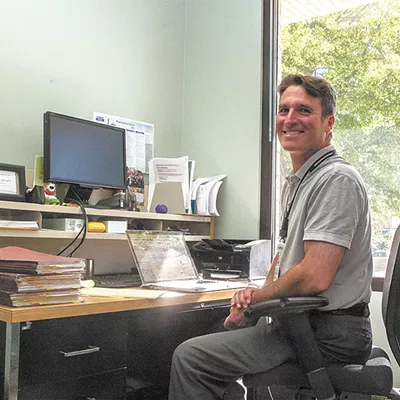
In Idaho Falls, the doors of the Behavioral Health Community Crisis Center of East Idaho have only been open for a little over a month. But already, it's having an impact.
"We have family members bring in people, [asking us] 'Can you help them? Because we really love them,'" says Brenda Price, the crisis center's coordinator. "We had a father bring in his grown daughter, [telling her] 'I'm going to take care of your kids, because you've just been depressed too long.'"
Stays at the Crisis Center are voluntary and limited to 24 hours. Yet in that time, the center's experts help them weather the roughest moments, develop a recovery plan and connect with the right community support systems. Similar centers, like one in Billings, Montana, show that done right, such facilities can alleviate overburdened emergency rooms, free up law enforcement, save money, and most importantly, set mentally ill residents on the road to recovery.
As of last week, 86 people have walked through the crisis center's doors in Idaho Falls; 34 of them had both mental health and drug addiction issues. Some were brought by police officers or sheriff's deputies. Others came with family members and of their own accord.
It's the type of facility North Idaho has long wanted, and narrowly missed getting last year. This year, it may get another chance.
If not for politics, Coeur d'Alene would already have a crisis center. But last year, North Idaho Reps. Ron Mendive, Kathy Sims and Vito Barbieri and Sen. Bob Nonini all voted against the legislation authorizing up to three different centers.
"There was a misconception that this was going to create a local bureaucracy," Rep. Luke Malek says.
Sims had doubted whether the benefit would be worth the cost. Mendive says he had questions about whether the voluntary 24-hour stays would be able to do enough for, say, suicidal patients.
Their "no" votes wouldn't have mattered — the bill passed anyway — but the legislature ultimately voted to fund only one of the three centers. Coeur d'Alene had to compete with Idaho Falls and Boise to receive it.
Coeur d'Alene actually topped the state's own scoring metric, assessing need, preparedness, community support and other factors. The city's proposal scored 257, narrowly beating Idaho Falls' 254.5 and Boise's 247.5. In particular, Coeur d'Alene's proposal excelled in its tight, convincing timeline — one evaluator said the city could have a crisis center up and running in as soon as 90 days.
In May of last year, Malek wrote a letter to the Idaho Department of Health and Welfare, pleading for the state to set the previous vote aside and look at the considerable local support: "Despite any rumors that may exist regarding political naysayers, those who carry influence in this community are fully invested, and willing to put forth whatever resources and time that are needed to ensure success."
It didn't work. The legislator opposition to the proposal in North Idaho led Gov. Butch Otter and the Health and Welfare department to pick Idaho Falls instead.
Now the process starts over. In his Jan. 12 State of the State speech, Otter called for another crisis center.
"We know that best practices across the country show that such local facilities reduce law enforcement and hospital-related costs while providing more sustainable support and better access for vulnerable citizens," he said.
Funding another center would need to be approved as part of the Health and Welfare budget being debated this week by the Joint Finance-Appropriations Committee. Malek and Sen. Shawn Keough, two of North Idaho's strongest crisis-center supporters, sit on that committee. They worry that opposition from North Idaho legislators will again hurt Coeur d'Alene's chances.
"My hope is that folks in Kootenai County, and in law enforcement and the judicial community, have been meeting with those legislators and explaining how critically important [a crisis center would be]," Keough says. "I will deliver that message, but it is more impactful when it comes from direct constituents."
This is, after all, a skeptical legislature — one that, for example, just nixed an eighth-grader's proposal to make the giant salamander the state amphibian because of concerns about "federal overreach."
Complicating matters, several of the North Idaho legislators who did vote to authorize crisis centers were defeated in the Republican primary. In Hayden, Eric Redman defeated Rep. Ed Morse; in Coeur d'Alene, Mary Souza defeated Sen. John Goedde.
After winning the Republican primary, Souza says she talked with several of the crisis center's local supporters to understand why they pushed for it. "I'm all in favor of these centers in their concept," she says.
But Souza and Redman both say they want to see how the current crisis center in Idaho Falls performs before committing to funding another. "From what I know, I think there's some areas of [the plan] that need to be refined," Redman says.
Mendive, too, is waiting to see the results in Idaho Falls. But since his "no" vote, he's been reconsidering. He's met with county commissioners, law enforcement and local health professionals, all of whom have underscored the importance of a crisis center. He respects their expertise.
"They assured me there's a cost savings on this," Mendive says. "A lot of people who know more about it than I do seem to think it will pay at the end."
Mendive says he hadn't heard any of that before the vote.
"I couldn't tell you how I'd vote if it came up today," Mendive says. ♦


























